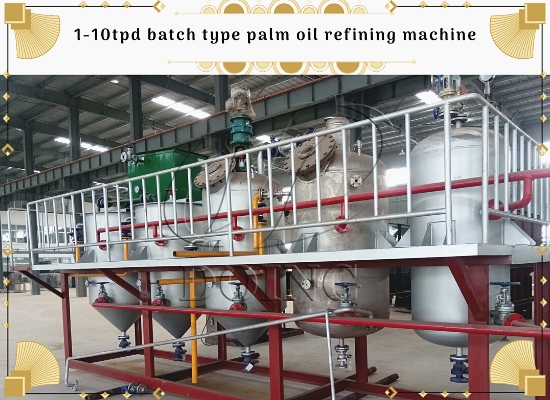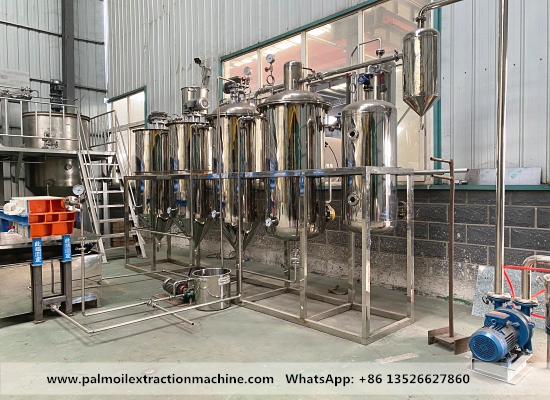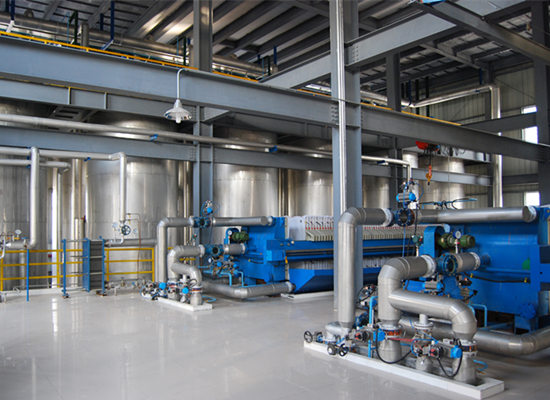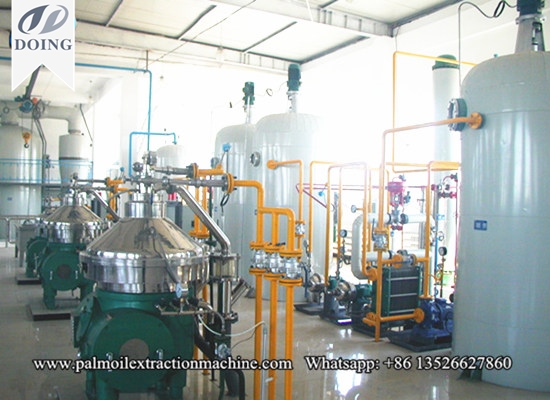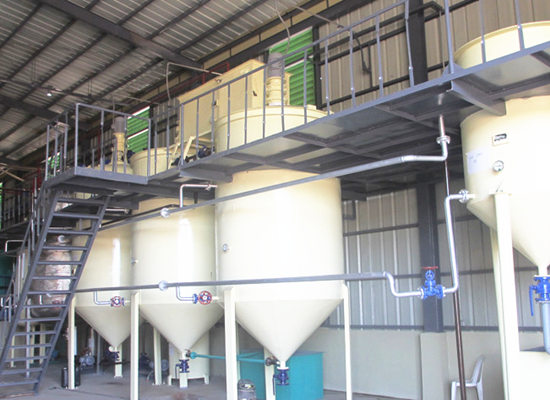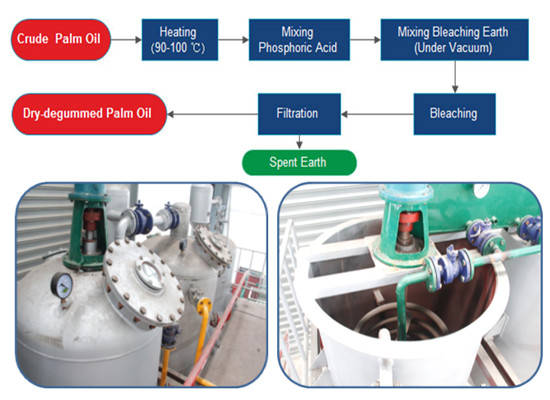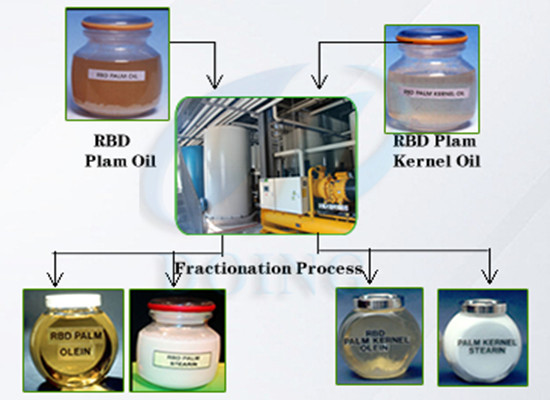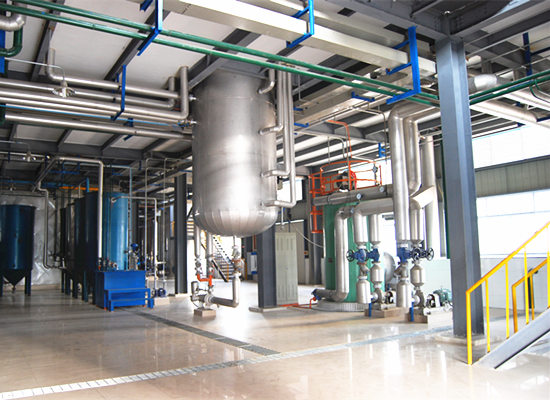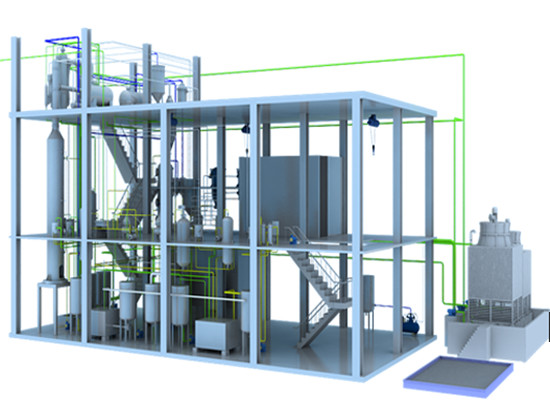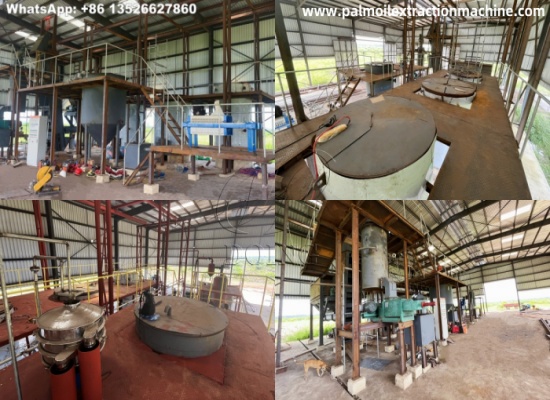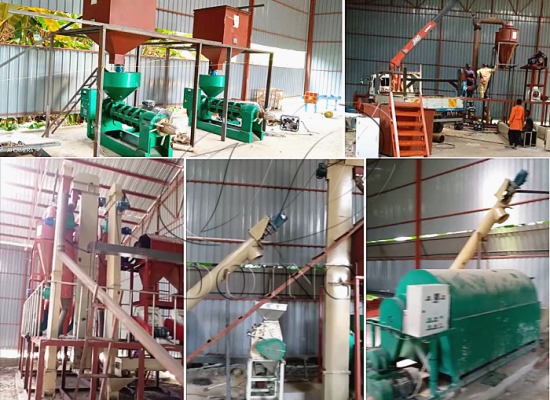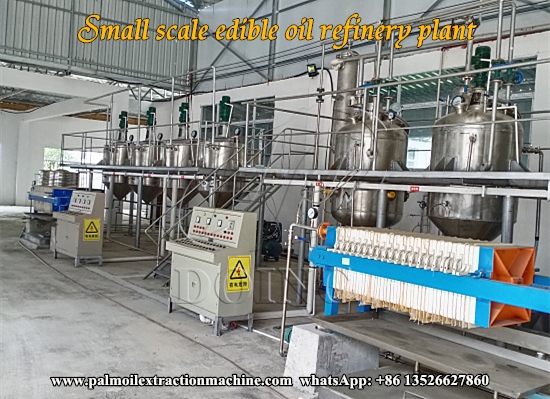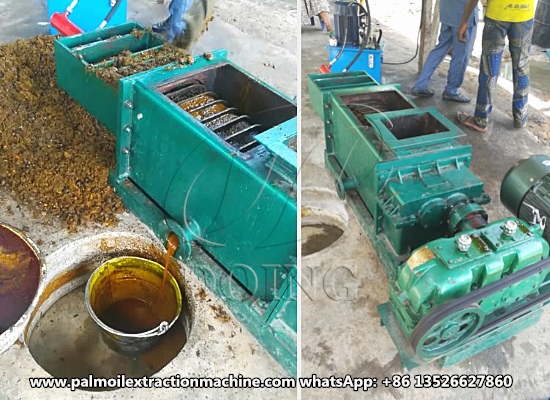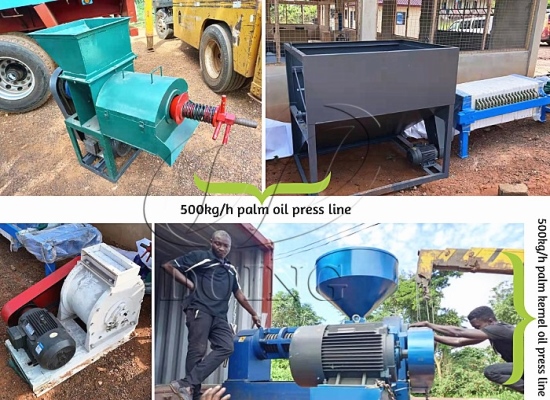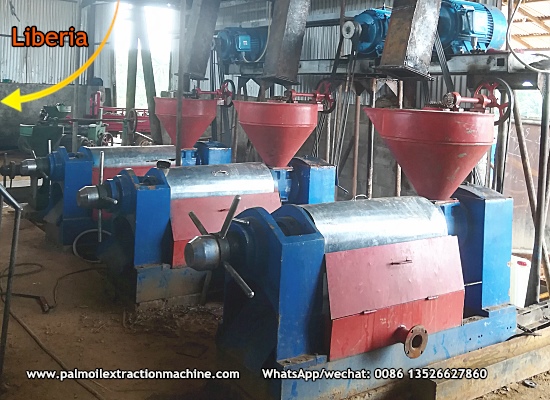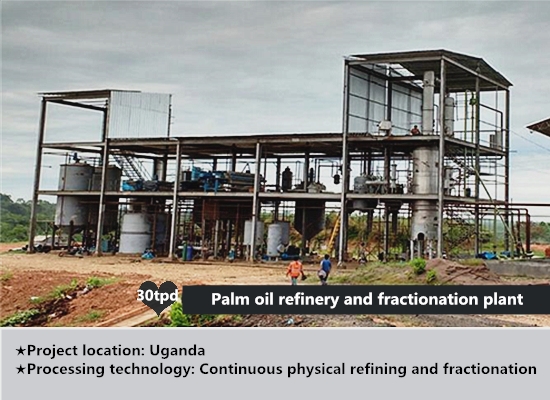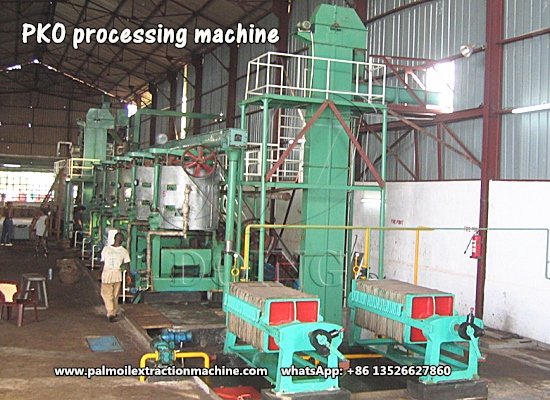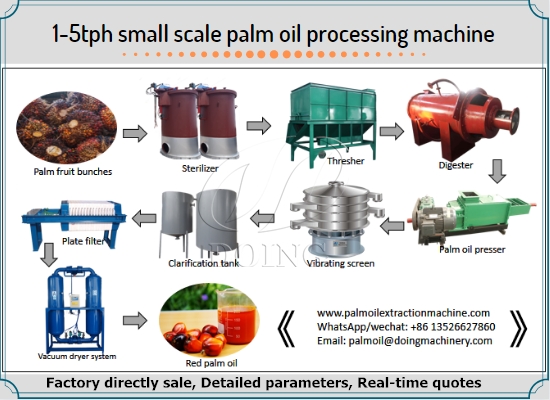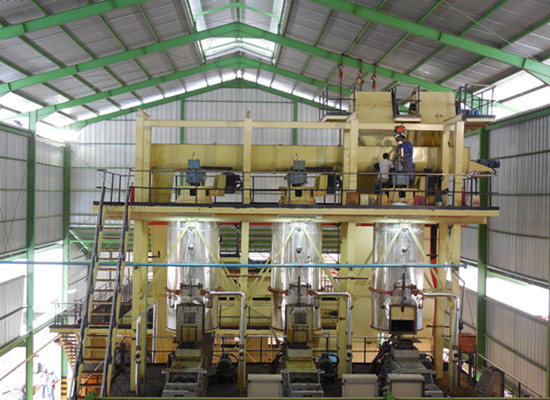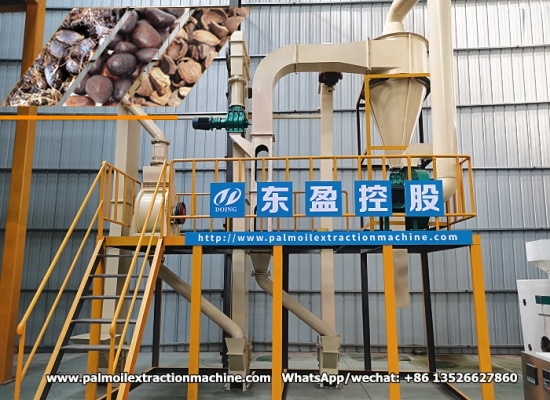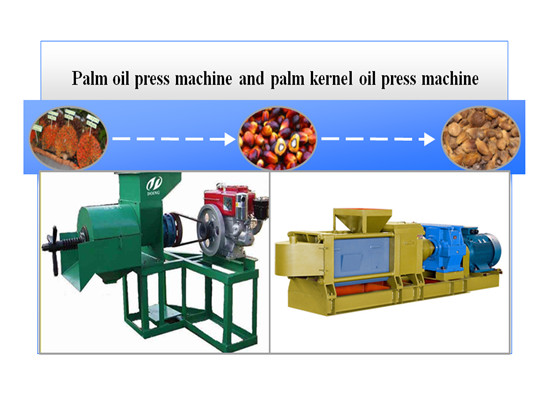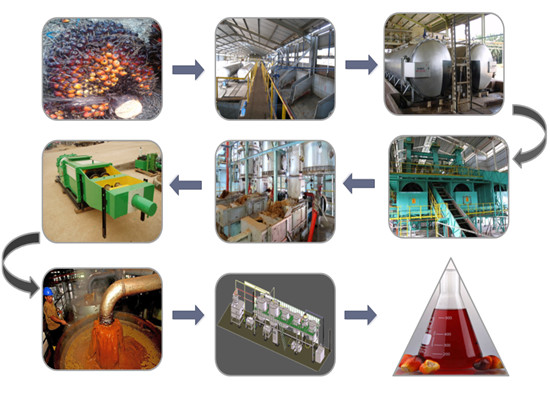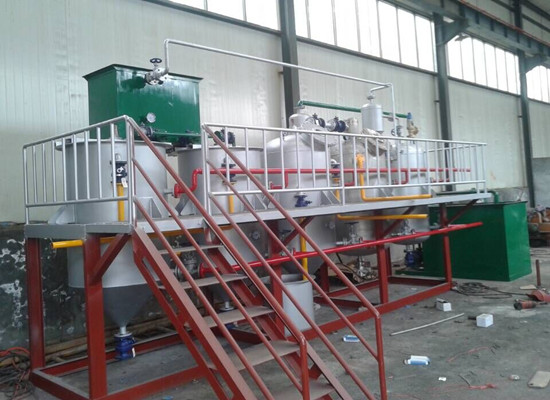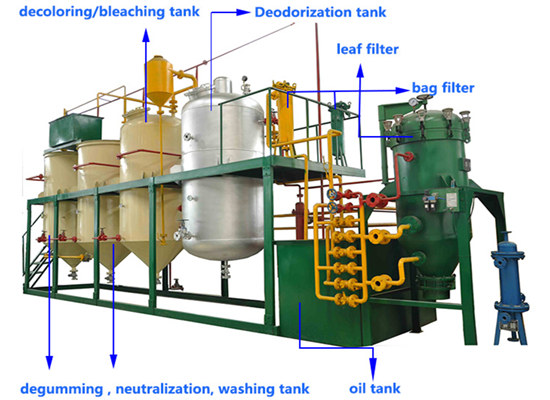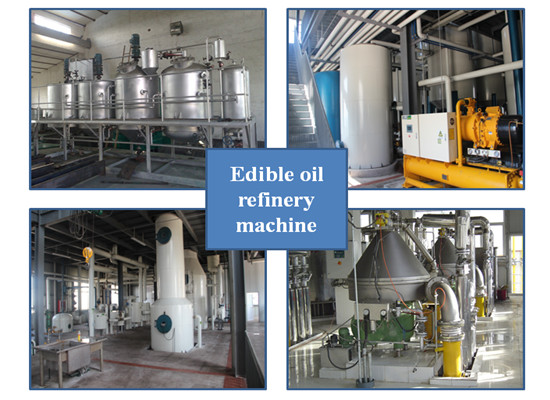50tpd continuous palm oil refinery plant
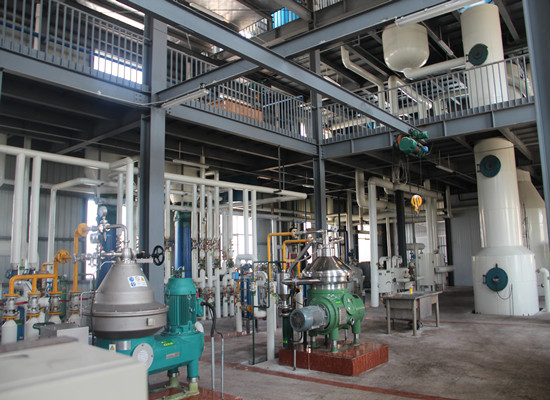
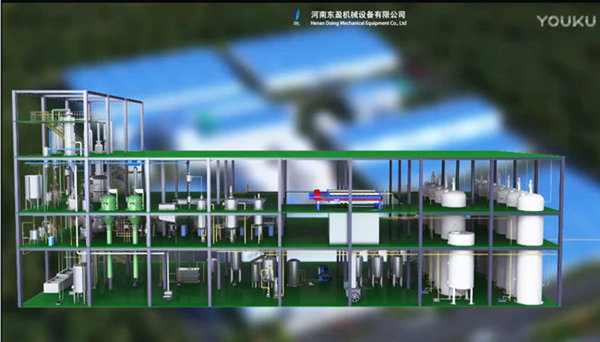
Continuous palm oil refinery plant 3D diagram
Henan Doing Company is a leading designer, manufacturer and exporter of edible oil refinery plant in both continuous type vegetable oil refinery plant and batch type vegetable oil refinery plant. It is very essential that the crude oil obtained from oil press workshop and solvent extraction workshop get refined in the vegetable oil refinery plants before it is utilized directly. Our continuous vegetable oil refinery plant gives color uniformity and appealing quality to the oil by removing unpleasant smell and undesirable factors from the oil.
Process flow chart diagram of continuous palm oil refinery plant:
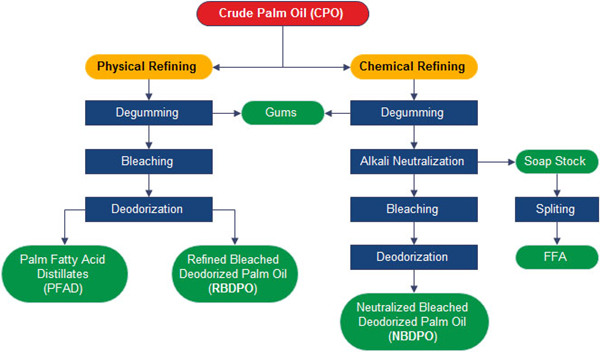
Palm oil refinery process diagram
Main equipment: Crude oil filter, Crude oil tank, Crude oil pump, Washing centrifuge,Degumming centrifuge,Vacuum dryer, Hot water tank,Soap-stock tank,Decolorization tower,Decolorization oil pump,Plate filter, Steam super-heater,Decolorizing oil tank, Deodorization tower,Deodorization oil pump,Vacuum system, Vacuum pump, Cooling tower, Thermal oil furnace, PLC automatic control
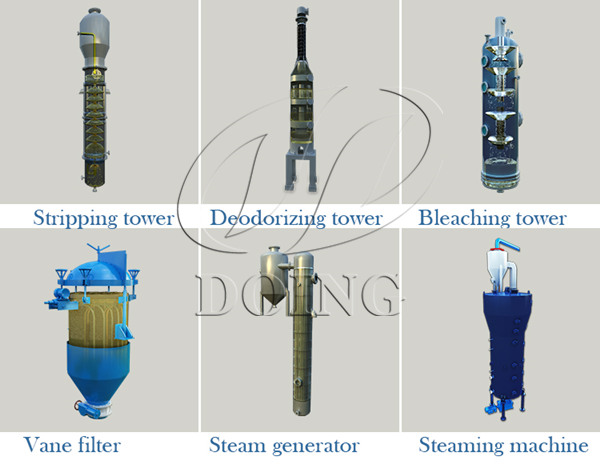
Mian equipment of continuous palm oil refinery plant
Calibrated crude palm oil is pumped to pipe filters; then filtered oil is sent to heat exchanger. Heated oil is mixed with acid in the mixer before going to the reaction tank. After reaction and cooling, the palm oil enters another mixer to mix with caustic alkali liquid to neutralize. The neutralized palm oil enters the centrifugal to separate soap from palm oil. Separated palm oil still contents some quantity of soap that should be removed. By mixing with hot water, the oil is washed. Then a centrifugal is used to separate the water with residual soap from oil.
De-gummed and neutralized oil is pumped into vacuum drier, and then dried oil is cooled by a heat exchanger and sent into a storage tank. De-gummed and neutralized oil is sent to bleaching section to bleach. Oil to be bleached is pumped to mixed tank and heating tank separately. A proportion of oil to be bleached is pumped into a mixing tank to mix with dosed bentonite, and another part of oil to be bleached is pumped to the heater. The mixture and the heated oil go into the bleaching tank to de-colourize. Consequently, the mixture of oil and bentonite is pumped into leaf filter to remove deposable bentonite.
Parallel leaf filters make it possible to perform continuous operation of bleaching. Filtered oil is pumped into the storage tank after being cooled in a heat exchanger and filtered safely.
Deodorization section is to remove the unpleasant odor from bleached oil. Certain amount of citric acid liquid is added to the oil to be deodorized to chelate the metal ion in oil. The oil then enters a deaeration tank to remove air in the oil by high vacuum. Then oil is pumped into a heat exchanger to raise temperature with hot deodorized oil; sunflower oil is heated further by mineral oil to raise the temperature to 240℃~265℃. The heated oil goes into the deodorizer tower from the top of flash sector; mixes with the rising steam to strip low molecular organic compound. Oil flows down to the bottom of tower to perform pigment decomposition. The flavor of oil is improved. Oil is pumped into the main sector of deodorizer tower to further remove free fatty acid (FFA). The vapor goes into FFA stripping sector to exchange heat; the condensed low molecular compound goes into the recycling FFA stripping system. The deodorized oil from the bottom of deodorizer tower is pumped out to exchange heat with oil that comes out from the deaeration tank, and then goes to a cooler. Finally, oil is filtered by polished filter. Final product is sent to final oil tank, which can be sold as first class product oil.
Mian process of 50tpd continuous palm oil refinery plant:
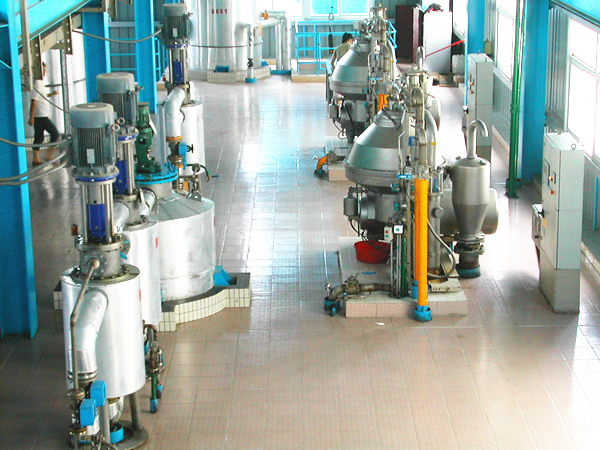
Palm oil degumming machine
During the neutral section, put the degummed oil with appropriate temperature and the appropriate concentration of alkali liquor into the centrifugal mixer, in order to achieve the best effect, the mixture is then sent to neutralization tank for enough time, in the process, liquid alkali saponification soap free fatty acid formation, and within the neutralization separator is separated.Formation soapstock also played an adsorption oil soapstock other impurities, and the function of color pigment.In order to enhance the separation effect, the mixture of oil/soap in neutralizing heater is heated to reduce its viscosity.
(2) Washing process:
The separated Neutralized oil still contains about 500 ppm soap; In order to reduce the residual content of soap, oil is joined by about 5% of hot water, and washed in the washing mixer, hot water will absorb oil soap and other impurities, remaining in the water separator are then separated.
(3) Vacuum drying section:
Output oil from the water washing neutralizing and washing oil separator, still contains some unfavorable to the stability of remaining water, in order to remove the residual moisture, oil was about 110-120 degrees, was taken to the tower of vacuum drying/desolventizing dehydration, drying oil is pumped directly into the decoloring process.In addition, at this stage to produce GB standard Class 3 cottonseed oil, Class 4 of rapeseed oil.
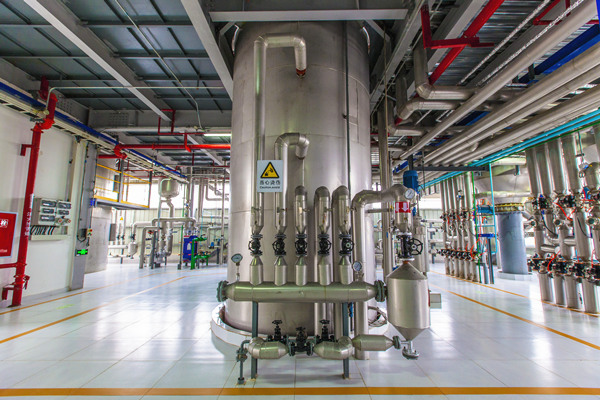
Decolorization tower of palm oil refinery plant
(4)Decoloration section
The decolorration section aims to remove pigment existed in the crude oil, soap residue in the oil and so on. Decolorization process includes the following stages:
a: Decoloration
Under steady flow control, oil uses low pressure steam and oil heater heating to 105 degrees. The heated oil is then sent to the vacuum bleaching tower.When oil enters the bleaching tower, mix with the clay through a mix ratio. Clay transport system used in the ground between the white folk to the clay storage, flowing into bleaching tower above of storage tanks.Bleaching tower is separated into several layers, each layer is equipped with a steam ejector, which is used for mixing oil and clay, the residual soap in the oil, gum precipitation, plastid and other metals has also been absorped by the bleaching earth.
b: Filter:
Oil from bleaching tower, mixed with clay, then pumped into the decoloring filter, and then enter the fine filter, clay and solid impurity is blocked here, filter (decoloring oil) is then transferred to the decolorizing intermediate storage tank.
Two decoloring filters are in this system, there is always one filter in filtering state, the other is in a state of empty and clean. When in the period of emptying and cleaning filter pressed by steam, so most of the oil in the filter is blowed to the decoloring oil tank, a small number of oil mixed with clay was discharged into steam cyclone and slop tank, filter cake blow dry steam; In the filter drying period, slop tank is also filling with leftover oil and condensate, finally the dry cake is at the bottom of the filter through the discharge valve, making use of pneumatic vibrator is fallen into the waste clay room.
The rest slop is pumped back to bleaching tower and be reprocessed.
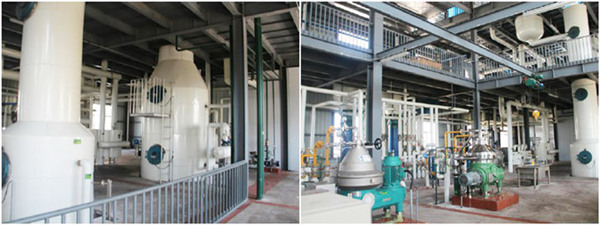
Deodorization tower of palm oil refinery plant
(5) Deodorization section:
Deodorization section aims to remove free fatty acids, small molecules that exist in the decoloring oil material, etc. It includes the following stages:
a: deaerator
From filter decoloring oil is stored within the decoloring oil tank, the tank is designed to work in the vacuum condition; from this tank, decoloring oil is pumped into the vacuum state analysis of the deaerator, release out the empty air in the oil.
b: Heat:
Entering the deodorization period of decoloring oil flow rate is controlled by a flow controller, oil is through a series of heat exchangers and heated to about 250-200 degrees of deodorization temperature:
When oil is heating in the final oil heater, part of the free fatty acids of low boiling point here and some of the volatile matter is evaporated, gas and liquid oil enters into the padding type deodorization tower from different entrances.
c: Deodorization:
After heating oil in flash tower, main deodorization tower, retention tank to distillation, vaporization and odor components of fatty acid in oil are removed.
d: Fatty acid recovery
In the washing area, the recycling of free fatty acid distillate flowing downwards from the top, which is often used to condensat rising free fatty acids and other condensate in the air. Condensation of distillates are collected in the temporary storage tank, the fatty acids are recycling: cooling in fatty acid distillates cooler, then recycled to the top of the fatty acids trap. Fatty acids temporary storage tank of liquid level is controlled by manual.
To reduce the quantity of fatty acid drops within air goes into the vacuum system and circular water pool, we installed a demister on the capture.
e: Heat-exchange and cooling
From deodorization tower, through deodorization pump to raw out the smelly oil, and then through the oil heat exchanger cooling by the incoming of decoloring oil, and then into the oil cooler, cooling by cooling water to the storage oil temperature,; finally through the fine filter for fine polishing filter, and then are fed into the product tank.
Economic & technical Index of 50tpd palm oil refinery plant ( degumming, deacidification, bleaching, deodorization)
| Power consumption | ≤28 KWH/ton oil |
| Steam consumption | ≤360~420 Kg/ton oil |
| White earth consumption | ≤8~20 kg/ ton oil |
| Caustic soda | ≤7 kg/ ton oil(according to crude oil acid |
| Phosphoric acid |
≤1.0 kg/ ton oil |
| Water consumption | Circulating water 60~65t/h |
| Water consumption 0.25~0.3t/ton oil |
We are professional manufacturer of palm oil refinery plant , besides continuous palm oil refinery plant ,we also supply batch oil refinery plant, semi-continuous oil refinery plant. We can customized palm oil refinery palnt according to the customer requirements. The batch palm oil refinery plant is suitable for the small scale oil refinery plant from 1TPD to10TPD. The semi-continuous oil refinery plant is suitable for the middle type palm oil refinery plant from 10TPD to30TPD. The continuous palm oil refinery plant is suitable for the large scale palm oil refinery plant from 30TPD to 1000TPD.
Leave A Message
If you want to know more information about 50tpd continuous palm oil refinery plant. pls kindly leave your phone number, We will back to you ASAP once we got your message.
-
 How to start a palm oil milling and processing plant?
How to start a palm oil milling and processing plant?
-
 How to start a palm oil processing business in nigeria?
How to start a palm oil processing business in nigeria?
-
 How to produce refined vegetable oil from palm kernel oil?
How to produce refined vegetable oil from palm kernel oil?
-
 What are the steps in palm oil production?
What are the steps in palm oil production?
-
 Why palm oil processing equipment is the key to determining palm oil quality?
Why palm oil processing equipment is the key to determining palm oil quality?
-
 What are the mill methods of palm nut oil? What are their different?
What are the mill methods of palm nut oil? What are their different?
-
 Why is palm oil deacidified during the refining process? How to perform deacidification?
Why is palm oil deacidified during the refining process? How to perform deacidification?
-
 What is the working principle of palm kernel cracker and separating machine?
What is the working principle of palm kernel cracker and separating machine?





